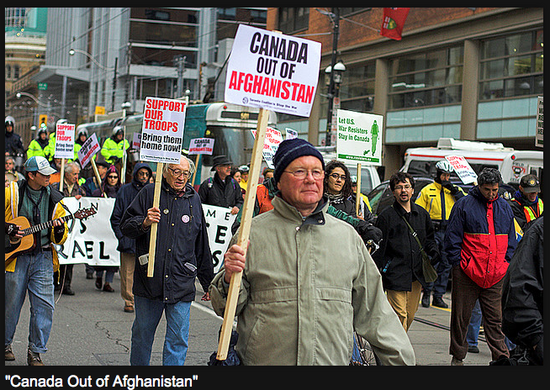Canada in Afghanistan...Failed Promises
By Dunia Abbas

Image
source: Flickr.
Last
Saturday, on May 28th, 2011, Bombardier Karl Manning became the
156th Canadian soldier to die in Afghanistan and the second to be killed in
2011. He was found dead from non-combat related wounds and an enemy action had
been ruled out. Accordingly, Minister of National Defense Peter MacKay released
a statement of condolences as well as the following: "The Canadian Forces
continue to make a positive difference in Afghanistan while protecting and
promoting both Canadian and international security". What is this positive
difference that MacKay is speaking of? And how are they protecting and promoting
both Canadian and International security? This is an issue that has presented
many concerns for Canadians and dominates much of their conversations. And if
it is not dominating their conversations, then it should because it is their
own government's credibility at stake and Canadians are the real investors in
their government's operations in Afghanistan.
Canada's
combined resources and expertise on the security, governance and development
fronts are playing no small part in helping the Government of Afghanistan
secure a supposed better future for its people. Canada has been unable to
deliver the results it has promised and has provided more ground for people
questioning Canada's presence there instead of answers and tangible
results.
The
first question that might come to one's mind is why is Canada so
interested in the well-being of the Afghan people? For almost 5 years now,
Israel imposes a harsh siege and the worst of its kind on the population of
Gaza which is causing new generations to be raised in poverty, fear and trauma
of Israeli warfare. Somalia is a nation that must surely qualify for the
worst place on Earth, with armed gangs roaming the streets as two groups vie
for the ability to become its government, meanwhile the population barely survives
on whatever food supplies reach it. In Uganda, an entire society - the Acholi -
is being systematically destroyed -physically, culturally, socially and
economically - in full view of the international community. The situation in
Uganda has been going on non-stop for almost 20 years but Western
governments have turned a blind eye to a pliant regime and dictatorship
under President Museveni that practices genocide. And yet, there is
no NATO to stabilize the situation, no U.S. military to surge its forces, no foreign
interventions promising to "free and stabilize" these places. That is why all
these humanitarian arguments for deploying in Afghanistan, invading Iraq, and
the recent United States/French joint bombing of Libya are just destined to
fail before they even begin.
The
argument that Afghanistan poses a threat to Canada's national security is the
one most mentioned. Assuming that because a country is a mess, then it is a
direct threat to Canadian's security is very inaccurate and illogical. It needs
to be understood that terrorism and insurgency are two very different things.
It is very possible to counter terrorist groups without starting wars in their
respective countries and claiming to build "new and better states". NATO needs
to revise its plans of deploying even more troops into Afghanistan and refocus
itself on how to really counter terrorism, if that is what its agenda is really
all about.
It
seems that the west is worried about its credibility since it has promised to
build a "decent state" in Afghanistan, but who asked for them for this
moral obligation of "saving the Afghans"? It is more apparent now than ever
before that the human rights of the Afghans are much worse than before.
Controversies have of course also swarmed throughout, with a Canadian soldier
charged with second-degree murder in late December 2008 and the Afghan detainee
abuse scandal.
And
what about the problems at home? Isn't ignoring problems at home much worse for
the west's credibility? In 2009, 6 out of 10 Canadians could be in trouble if
their pay cheque gets delayed and Canadian consumer debt to financial assets
ratio is the worst of 20 OECD nations. In 2011, According to the Canadian
Centre for Policy Alternatives, the richest one percent of Canadians increased
their income two-fold since the late 70s, the richest 0.01% seven-fold,
and yet the income of the common person hasn't noticeably changed.
Obviously this level of inequality is indefensible by any moral standard, and
every thinking person knows there is something wrong with an
economic system in which the fastest-growing incomes are those which are
already the biggest. The estimated cost of continuing Canadian operations in
Afghanistan? As high as CAD$18.5 billion at the end of last year, according to
the Parliamentary Budget Officer.
The
argument that if the west fails in Afghanistan, then NATO might fall apart and
all of the west's enemies around the world will become more powerful is hugely
overstated. When foreign intervention is reduced in Afghanistan and all this
faith in a NATO-led war disappears (if it hasn't already), only then will its
government be able to take control and build its country. Afghan government
efforts need to be coupled with its people's involvement if good government is
to be secured long-term.
Where
is the evidence that Afghanistan is more "stable"? In fact, the fighting is
intensifying, casualties are mounting and the Taliban is becoming more
confident. These patterns of failed foreign interventions, with massive ground
interventions to "combat terrorism" and help build a new and improved state,
which then lead to high human costs (which means dead family members and
friends) and the destruction of countries, and are immoral,
counter-productive, and just do not work.
Leave a comment